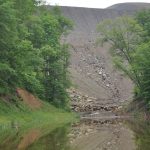
The National Mining Association shrugged when a review of research linking mountaintop removal to human health impacts was halted. But the NMA does not speak for coal communities.

The National Mining Association shrugged when a review of research linking mountaintop removal to human health impacts was halted. But the NMA does not speak for coal communities.

The Clearfork Valley of Tennessee has been intensely surface-mined going back decades. Now, Kopper Glo Mining is moving forward with a nearly 1,500-acre mountaintop removal mine on nearby Cooper Ridge.

The U.S. Department of the Interior ordered the National Academy of Sciences to halt its review of the links between mountaintop removal coal mining and human health impacts.

As expected, the Federal Energy Regulatory Commission recently gave a glowing review to the Atlantic Coast Pipeline, overlooking the threats to wetlands, forest, drinking waters and indigenous populations along the pipeline’s proposed route.

This summer, the U.S. Forest Service will host a series of open houses in western North Carolina as part of its 15-year planning process for the Nantahala and Pisgah National Forests.

The coal lobby’s influence over the White House is a given at this point — as is the White House’s willingness to put its finger on the scale in favor of our dirtiest, most carbon-packed energy sources.

Guest bloggers Divest Appalachian members Cassidy Quillen and Olivia Nelson take a look at how the Atlantic Coast Pipeline touts an ideology of sustainability while profiting off of industries driving climate change.

The public has taken every opportunity to tell FERC to reject the Atlantic Coast Pipeline. There’s still time to add your voice to the choir of people across the country urging FERC to reject the unnecessary and unwanted project.

The White House released its budget blueprint last week, and the proposal is nothing short of a disaster for Appalachia and rural communities across the country. Here’s a look at a few agencies and programs the White House wants to completely eliminate if it had its way.

When Congress voted last week to overturn the Stream Protection Rule, people braced themselves for the coming impacts. But threats to public water from corporate and political interests are nothing new in Central Appalachia, nor is the problem unique to this area. In the face of these threats, communities fighting for clean water need our continued support.